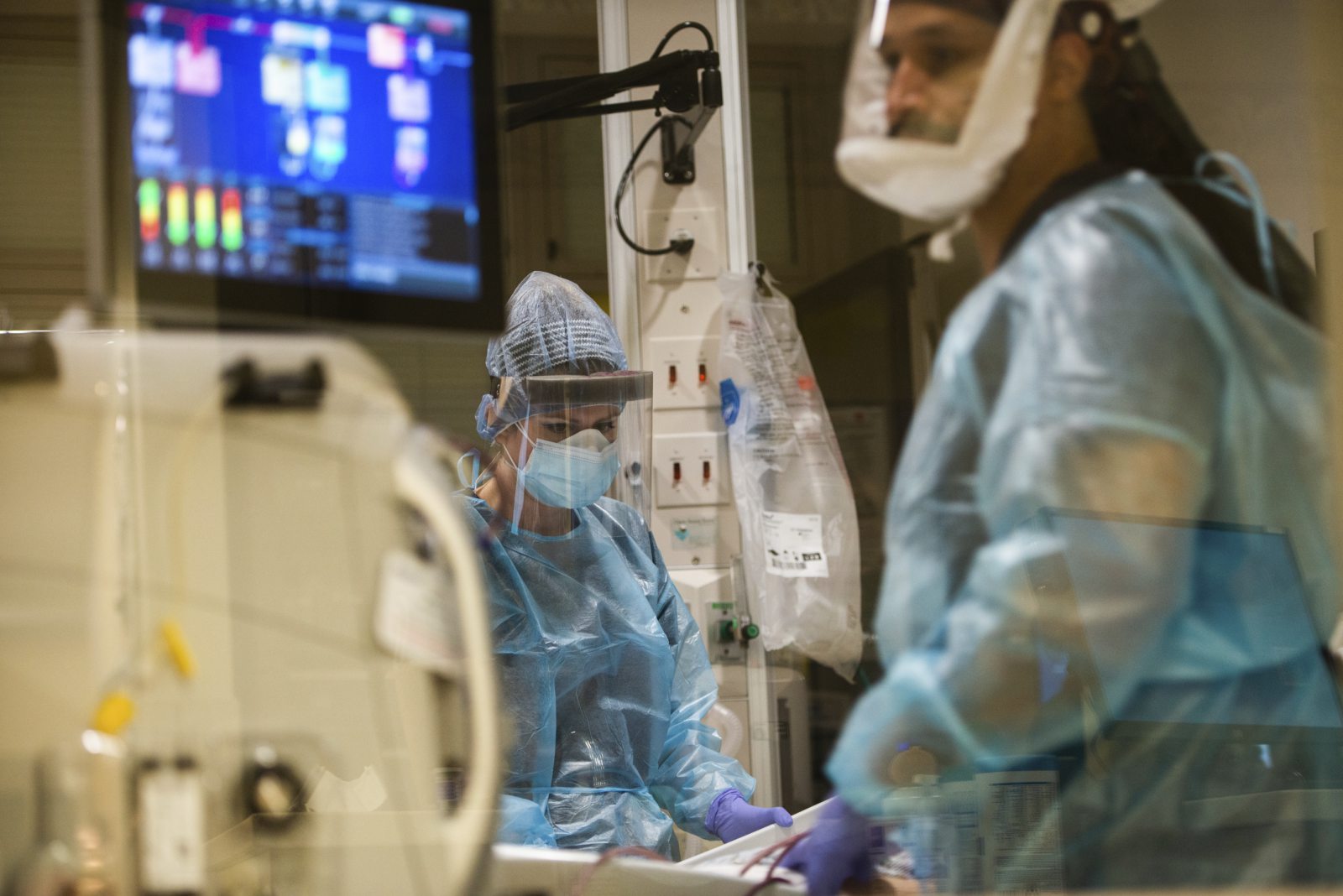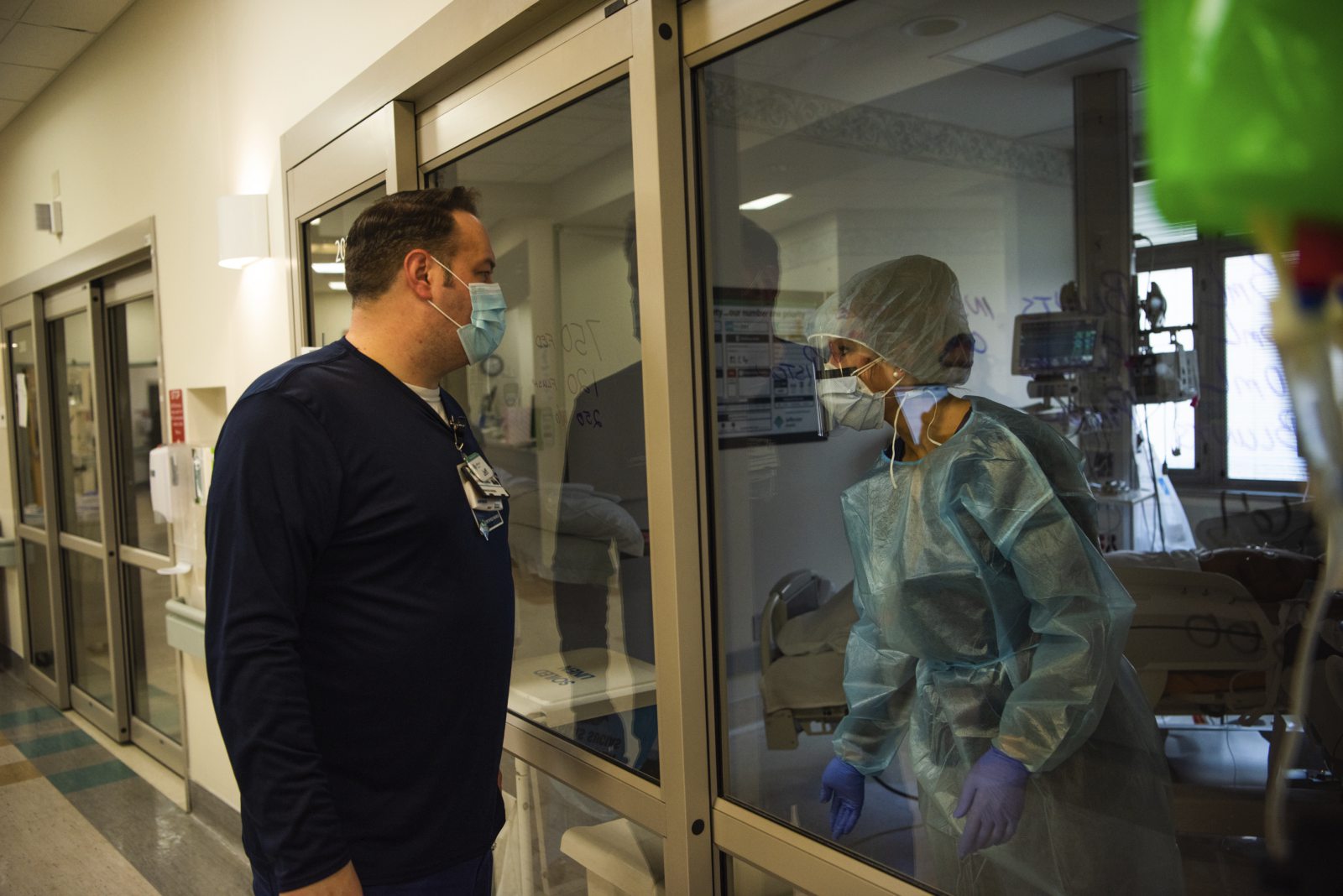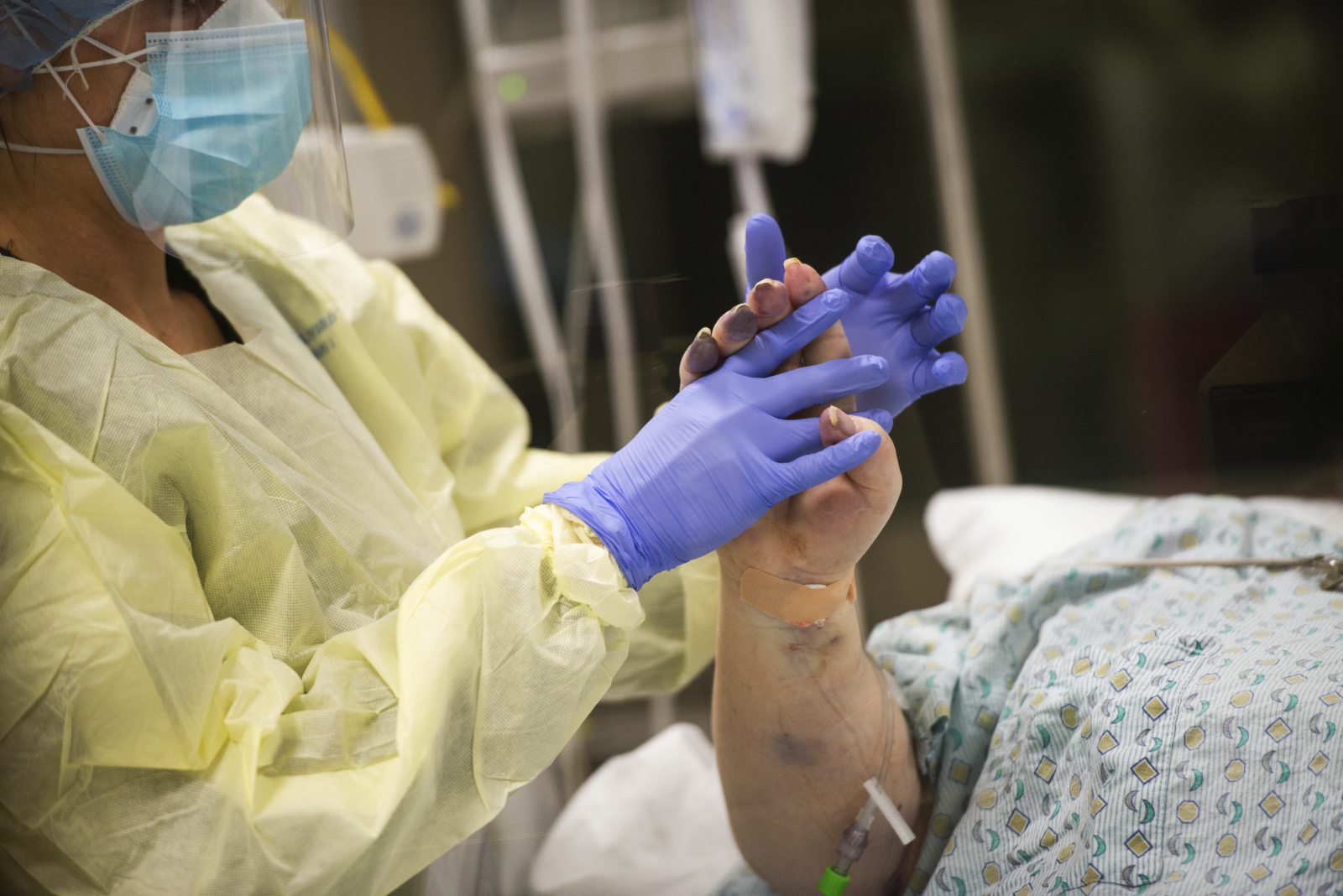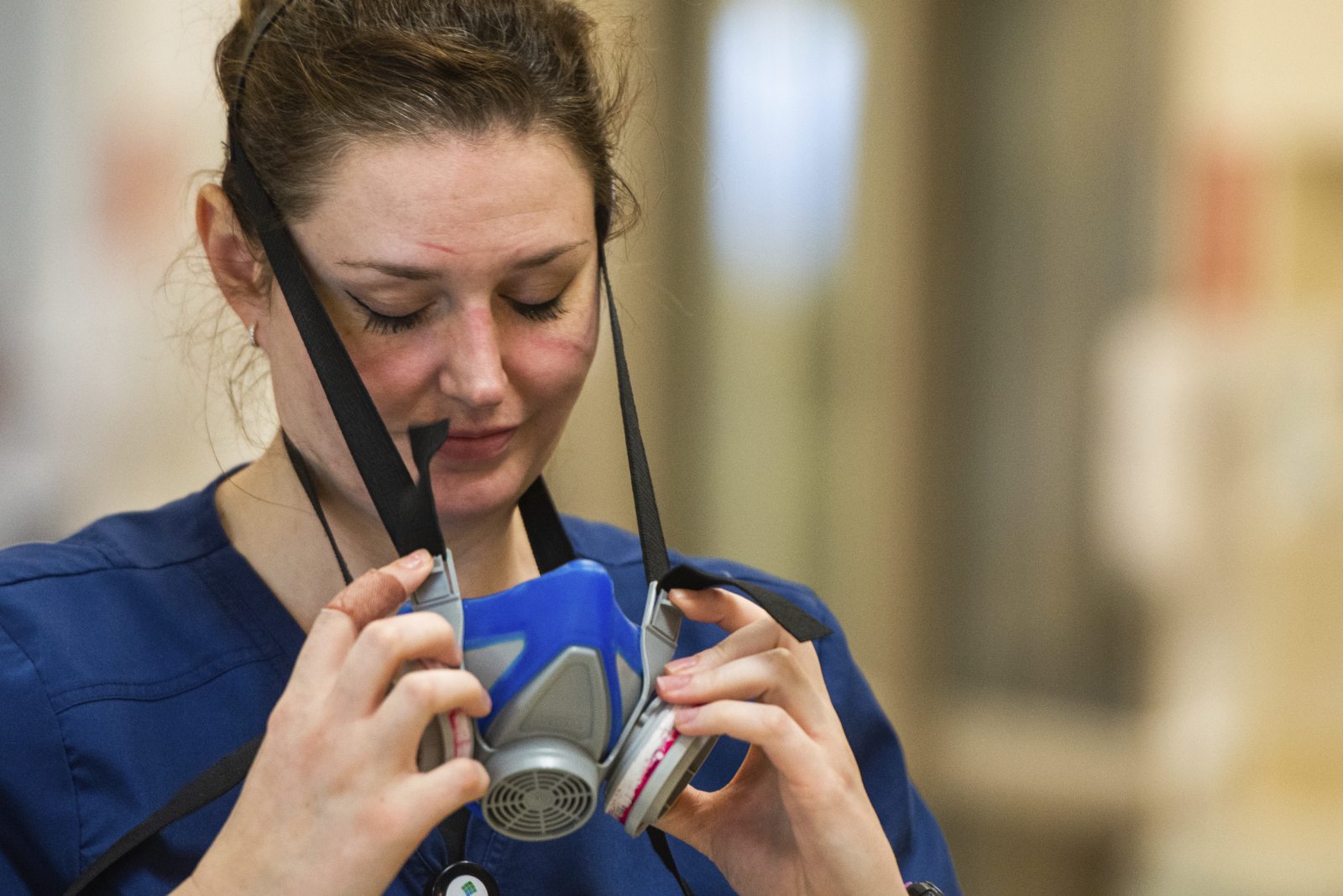

Story by MEGAN GUZA | Photos by SHANE DUNLAP
January 30, 2022
Inside a room in the intensive care unit at Allegheny Health Network’s Jefferson Hospital, a covid-infected man lies prone on his stomach, hooked up to a ventilator that is breathing for him.
The room is noisy, even though the man can’t speak. Chimes and beeps are accompanied by the constant, dull roar of a blower that cycles out air to protect doctors and nurses from airborne viruses.
The man, sedated and unaware, is not expected to make it out of the unit alive. Nurses there know from experience that those who are intubated rarely breathe on their own again.
One of those nurses, Andrea Dugan, is at the end of a 12-hour shift in the ICU. As the 38-year-old exits the man’s room, she removes her protective gown and gloves and throws them into a trash can inside the room and then, once outside, changes masks, wipes down her face shield and washes her hands. Her brunette hair is pulled back in a surgical cap.
Leaning against a desk at the nurses’ station, she stares through the wide wall of windows into rooms in the unit and describes what her job has been like for the past two years.
“In a word, hell.”

Jefferson Hospital in Pleasant Hills received some of Allegheny County’s first covid patients. The first death recorded in the county happened here. The Tribune-Review spent, over two Thursdays, a 12-hour shift with the ICU nurses at Jefferson.
In spare moments, the nurses talked about the anxiety, exhaustion and nightmares brought on by the pandemic. Some feel haunted.
Registered nurse Kristy Lewis said she still sees the faces of each person she has watched die during the pandemic. She was there for that first death. She remains on the front line as the death toll continues to rise here and across the country.
“I am usually the last person that they see. I am usually the last person to hold their hand while people die,” Lewis said. “I have to be not only their nurse, but I have to be their family, their support person, their whatever they need me to be at that moment.”
It’s a position she never expected to be in.
“I have never been as emotionally vulnerable,” she said, “as I have been with these patients.”
On this particular day, nurses say they are in a bit of a lull. There are just a few covid patients in isolation, along with some post-covid patients as well.
All are on ventilators. Most, she said, are not vaccinated.
“Some people say, ‘This is what you signed up for,’ but you never understand until you’re put in that situation how hard it is,” Lewis said. “I’m always amazed at the process between living and dying.”
The nurses start their shifts at 7:30 a.m. Rounds begin around 9 a.m. Most of this crew will be on the job until 7 or 7:30 p.m.
The nurses are joined on their rounds by pharmacists, an internist, a respiratory therapist and a chaplain.
“They will go from patient to patient to patient to patient, and everybody talks about the patient from their own perspective, and they set a plan for the day,” said Dr. Chong Park, the hospital president.
In the ICU, registered nurse Elizabeth Carr has just emerged from a covid patient’s room, where she gave a middle-aged patient his morning medication, checked his IV bags and listened to his lungs. There was no conversation — the patient couldn’t speak because he was intubated.
All covid patients who reach the ICU look similar from one room to the next: eyes closed, neck and jaw slack, mouth agape to make way for the ventilator tube, which is kept in place by ties and tape.
Patients are sedated so they can’t fight the ventilator — to be conscious of a wide plastic tube down one’s throat, unable to move or speak, is a terror most can’t and don’t want to handle.
Everyone working on the unit acknowledges that a majority of the covid patients who reach their floor will not leave alive.
The flood of death has taken its toll. Carr has worked only occasionally in the medical ICU since taking a step back from her duties there in May.
“I love this unit, I like my managers, I like my friends here, and I don’t mind taking care of these (types of patients), but … it got to be a bit much,” said Carr, who is in her 30s. “My mental state was rocky for a little bit. I enjoy it — it’s my job — but it wears on you.”
She works regularly in a surgical ICU at a different hospital, which she said makes it easier to go back to the medical ICU like she has on this day.
The man whose room she just left is prone right now, lying on his stomach. This is common for patients in respiratory distress, as it takes some of the strain and pressure off the lungs. But they can’t stay like that for long because they could develop pressure sores on their face.
Later, three or four nurses will go in and turn the man onto his back. Being facedown means a lot of secretions from the nose, face and eyes, and Carr and other nurses will clean him up. They’ll wash his face and carefully brush his teeth.
Covid numbers dropped off in the months after vaccines became widely available in late spring 2021, and for the first time in months, hospital staff members were optimistic, said Joy Peters, Jefferson’s chief nursing officer. Then came the delta variant, which spread faster and proved much more severe for many.
“We had some really dark days in the last probably four to five months where nobody was surviving coming off the ventilator,” Peters said. “And this time around, it wasn’t grandma that was dying. It was 29-year-olds and people that are just so very young.”
When the hospital began offering monoclonal antibody treatments, an ICU nurse was transferred to that clinic.
“Emotionally, she actually needs to see that people can survive this, because she has seen so much death, like body bag after body bag,” Peters said.

A few rooms down from the patient in Carr’s care is Kristy Lewis’ patient.
Lewis has been at Jefferson for 12 years. She said she’s lucky this day. Her patient, an older woman, is over the acute covid infection, meaning she is no longer contagious and is now out of isolation. That means Lewis doesn’t have to put on and take off the layers of personal protective equipment every time she goes in the patient’s room.
The patient remains on a ventilator. She’s been hooked up to one for more than 20 days now.
“A lot of people think about covid as acute: You get covid, get really sick, you have all these problems, and you either get better or you pass away,” Lewis said.
But that’s not always the case. Even those who survive can be left with lungs so scarred that they can’t breathe on their own, she said.
“Their lungs are so compromised from the covid and their comorbidities, and sometimes we do all these things and get them over that short-term phase, but there’s also a long-term phase that people don’t realize,” Lewis said.
“Normally, if this was an average ICU patient, we would be talking about things like a tracheostomy or getting them to a rehab center,” she added. “The problem with that is, her lungs are so bad that we can’t even safely do that. She’s stuck between a rock and a hard place.”
To die in the ICU is likely to die alone.
“This is going to be the loneliest, scariest time of your life. You’re probably going to die alone if you wind up here or (you will be) surrounded by strangers,” said Dugan, the ICU nurse who summed up the pandemic as “hell.”
To die in here is likely also to die slowly.
“It’s a very long, slow process, and it honestly just feels like torture, the entire process,” Dugan said, noting that many nurses have started therapy or begun taking anti-anxiety medication to help cope with the trauma.
Dugan said on the rare occasions that someone on a ventilator makes it home, she tells them to volunteer for a good cause.
“Someone somewhere likes you, so you need to make up for your second chance because you are one of the very lucky few,” she said.

Environmental services worker Adrienne Revetta must don the same layers of personal protective equipment that doctors and nurses wear when she enters and exits patients’ rooms. And she has dealt with the same anguish.
“When you work in critical care, you know you’re up against something. But never tragedy like this. It’s almost like you’re in a bad dream and you never woke up,” she said after emerging from a patient’s room.
The 51-year-old cleaned the room earlier, wiping down surfaces and taking out trash. When she has extra time, she goes back through the rooms, making it a point to wipe down the glass that everyone touches.
Slight and soft-spoken, she said she is scared to death every day.
Like the nurses, she often finds the whole ordeal hard to talk about, particularly with people who don’t work in the field.
“You get teary-eyed and cry, and people just don’t really know what’s going on out in the world,” she said. “I don’t want to scare anybody, but it’s like working in a war zone. This is hard, and nobody would believe us if we told them. People ask, ‘Are they really exaggerating on the news?’ I’m like, ‘No. It’s 10 times worse.’”

Because Lewis’ patient is no longer in isolation, her family can see her.
Covid patients with active infections cannot have visitors. All other inpatients in other wings of the hospital are limited to one visitor at a time. The family of Lewis’ patient comes in around 3 p.m. on this particular day. Lewis takes in several more chairs for the four of them. She goes back in with several boxes of tissues.
They are there to say goodbye.
Lewis put on classical music in the room before the family arrived. It acts as a contradictory soundtrack throughout the hall to the symphonic work nurses and doctors perform behind glass in the rooms of sick patients.
The music is the backdrop to the emotional goodbye happening in the room. Family members stroke the woman’s hair and rub her feet. They lean close, resting their heads on her arm and talking quietly. They wear masks, and their eyes are red-rimmed from crying.
Later, one family member walks out to the nurses’ station and says almost inaudibly to Lewis, “We’re ready.”
“I have too many kids having to make decisions for parents, for grandparents, and not being ready for that,” said Lewis, who is in her mid-40s. “It is a huge burden that a lot of our patients’ families feel. It’s very difficult — difficult for everybody around them, especially when right before covid they were perfectly fine.”
There is nothing tangible for them to understand.
“People sort of think it’s sort of like the flu or a cold,” Lewis said. “Well, (it’s) not really. Until people understand that and people put it in perspective, we’re going to keep on doing what we’re doing.”

For many young nurses, their entire career so far has been the pandemic.
“I graduated nursing school in October 2019. I’d just gotten out of orientation, and it was like, ‘OK, here’s a global pandemic, have fun,’” said registered nurse Jasmin Wadsworth. “It’s just pretty much all that I’ve had since I’ve been a nurse — covid. There’s a decent bit of staff that started at the same time, and that’s all we know — covid.”
She is 26. Nothing in nursing school could have prepared anyone for the past two years, she said.
“They tell you in nursing school what an epidemic is and what a pandemic is and how to deal with disaster situations,” Wadsworth said. “But those disaster situations are only for a moment in time and not ongoing for two, three years at a time.”
It’s also not the environment that brought longtime nurses into the ICU.
“The ICU environment has completely done a 180,” Dugan said. “The ICU was a place of hope. You would come here to help people through their darkest moments, to try to help them get better, to be able to transfer someone out, to provide that support to see them go in the right direction.”
Now?
“Now it’s basically the land of the dead,” she said. “The vast majority of our patients, unfortunately, tend to die. So it’s the opposite.”

Today is only an eight-hour shift for Bre Feldner, the assistant nurse manager on duty. She has just finished her shift, and as she changes from an N95 mask to a surgical mask, the red outline from the edges of the tight-fighting mask is visible on her face.
The 30-year-old has been at Jefferson for almost nine years, all of them spent in the ICU. She did an internship here during college and worked as an aide during her senior year. She started working full time right after graduation.
Related story
• Coming up short: Pennsylvania hospitals wrestle with nurse staffing issues as pandemic drags on
Last year, she said, there was a sense of hope among nurses as vaccines became available and the number of cases and deaths dropped. Then things changed with the delta and now omicron variants.
“This time around, it’s different,” said Feldner, who helps coach high school track in her spare time. “We’re all tired. We’re very tired. We’ve been at this for two years. It’s been a long time.”
Nurses have come to rely on each other, Wadsworth said.
“Sometimes we can talk to our families and our friends outside of the hospital,” she said, “but the only people who really truly understand what you’re going through are the people that you work with.”
The health system recently started offering support groups for staff.
“It’s nice to hear somebody else validate what you’re going through,” she said. “Sometimes the public can’t and doesn’t.”
The pandemic has worn down many of those on the front line.
“A lot of us started medication, therapy, cutting back hours,” Dugan said. “A lot of people have quit, gone into different fields, left the hospital environment because they just couldn’t stand doing this kind of stuff.”
As she leans against the nurses’ station desk toward the end of her shift, she stares off into a patient’s room. She says she is tired and frustrated.
“You get affected because you almost feel like you’re failing,” she said. “Part of it is just holding onto the hope that one day it will end. It’s just trying to hold out until then.”
Megan Guza is a Tribune-Review staff writer. You can contact Megan at 412-380-8519, mguza@triblive.com or via Twitter.